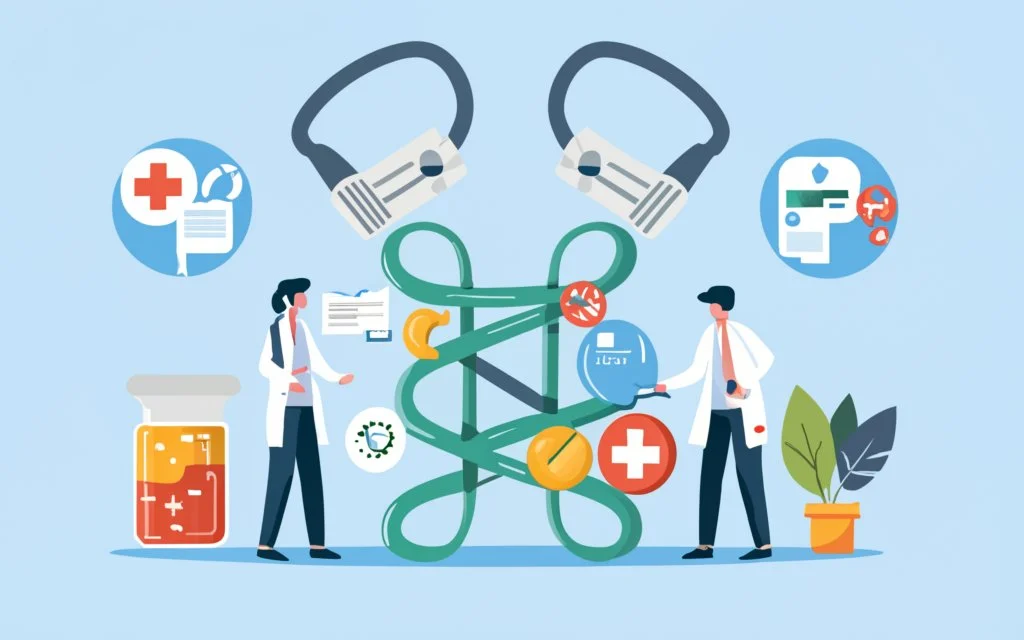Pharmacogenetics in Assignments: Combining Genetics and Drug Therapy

Pharmacogenetics, a burgeoning field at the intersection of genetics and pharmacology, holds immense promise for revolutionizing drug therapy. By studying how an individual's genetic makeup influences their response to drugs, pharmacogenetics aims to personalize treatment regimens, optimize efficacy, and minimize adverse effects. In academic settings, integrating pharmacogenetics into assignments offers students a dynamic platform to explore the practical applications of genetics in clinical practice and drug development. Delving into the realm of pharmacogenetics can provide a fascinating and relevant avenue for academic exploration.
Assignments in pharmacogenetics typically involve a multifaceted approach, incorporating principles from genetics, molecular biology, pharmacology, and clinical medicine. Students may delve into understanding the genetic variations underlying drug metabolism, efficacy, and toxicity. Through case studies or simulations, they analyze how genetic polymorphisms impact an individual's response to specific medications, elucidating the concept of personalized medicine.

One key aspect of pharmacogenetics assignments is exploring pharmacogenomic data and bioinformatics tools. Students learn to interpret genetic testing results and predict drug responses based on an individual's genotype. They may explore databases like the Pharmacogenomics Knowledge Base (PharmGKB) to identify genetic variants associated with drug responses, fostering critical thinking and research skills.
Additionally, assignments often emphasize the ethical, legal, and societal implications of pharmacogenetics. Students engage in discussions surrounding issues such as patient consent for genetic testing, data privacy, and equitable access to personalized medicine. By grappling with these complex ethical dilemmas, students gain a holistic understanding of the broader implications of integrating genetics into healthcare practice.
Furthermore, pharmacogenetics assignments may incorporate practical components, such as designing personalized drug therapy plans based on genetic profiles. Students develop clinical reasoning skills by considering factors like patient demographics, medical history, and genetic predispositions to tailor treatment strategies. This hands-on approach fosters clinical decision-making skills essential for future healthcare professionals.
Moreover, assignments in pharmacogenetics encourage interdisciplinary collaboration. Students from diverse backgrounds, including genetics, pharmacy, medicine, and bioinformatics, work together to analyze and interpret complex genetic data. This collaborative learning environment mirrors real-world healthcare teams, preparing students for interprofessional practice in the field of personalized medicine.
Understanding Pharmacogenetics: A Primer
Pharmacogenetics, a field at the intersection of genetics and pharmacology, explores how an individual's genetic makeup influences their response to drugs. This primer serves as an introductory guide to the fundamental concepts and applications of pharmacogenetics.
At its core, pharmacogenetics focuses on elucidating genetic variations that affect drug metabolism, efficacy, and toxicity. These genetic variations, known as polymorphisms, can alter the activity of drug-metabolizing enzymes, drug targets, or transporters, thereby influencing an individual's response to medication. By understanding these genetic factors, healthcare providers can tailor treatment regimens to optimize therapeutic outcomes and minimize adverse effects.
One key concept in pharmacogenetics is the role of pharmacogenomic biomarkers. These biomarkers are specific genetic variants associated with drug response phenotypes. For example, certain variations in genes encoding cytochrome P450 enzymes can affect the rate at which drugs are metabolized, leading to differences in drug efficacy and toxicity among individuals. Pharmacogenomic biomarkers serve as valuable tools for predicting an individual's response to medication and guiding personalized treatment decisions.
Moreover, pharmacogenetics encompasses the study of drug-gene interactions. Different drugs interact with specific genetic variants in diverse ways, influencing their pharmacokinetics and pharmacodynamics. For instance, some medications may be more effective or have increased toxicity in individuals with certain genetic polymorphisms. Understanding these drug-gene interactions is crucial for optimizing drug therapy and minimizing adverse reactions.
Furthermore, pharmacogenetics has significant implications for clinical practice and drug development. Personalized medicine, which tailors treatment regimens based on an individual's genetic profile, is a prominent application of pharmacogenetics in healthcare. By incorporating pharmacogenomic information into clinical decision-making, healthcare providers can prescribe medications with greater precision, leading to improved patient outcomes and reduced healthcare costs.
The Genetic Basis of Drug Response
Pharmacogenetics delves into the genetic variations that dictate how individuals respond to medications. Genes play a pivotal role in encoding drug-metabolizing enzymes, drug transporters, and drug targets, thereby influencing drug efficacy and toxicity.
Pharmacogenetic Variants and Their Effects
Certain genetic variants can alter drug metabolism pathways, leading to variations in drug efficacy and adverse reactions. Understanding these variants is crucial for predicting individual responses to medications and optimizing treatment outcomes.
Clinical Implications of Pharmacogenetics
The integration of pharmacogenetics into clinical practice enables healthcare providers to tailor drug therapy based on patients' genetic profiles. This personalized approach minimizes the risk of adverse drug reactions and enhances treatment efficacy, marking a paradigm shift in modern medicine.
Pharmacogenetics in Academic Assignments: Enhancing Learning Experiences
Pharmacogenetics, the study of how genetic variations impact individual responses to drugs, offers a compelling avenue for enriching academic assignments across various disciplines. By integrating pharmacogenetics into academic coursework, educators can enhance learning experiences by providing students with a deeper understanding of the genetic basis of drug responses and fostering critical thinking skills applicable to personalized medicine and clinical practice.
In academic assignments, pharmacogenetics serves as a bridge between genetics and pharmacology, allowing students to explore the intricate relationship between genetic makeup and drug therapy outcomes. Assignments often delve into understanding how genetic polymorphisms in drug-metabolizing enzymes, drug targets, or transporters influence drug metabolism, efficacy, and adverse reactions. By analyzing case studies or real-world examples, students gain insights into the practical applications of pharmacogenetics in tailoring treatment regimens for individual patients.
Moreover, incorporating pharmacogenetics into assignments encourages students to engage with bioinformatics tools and databases to interpret pharmacogenomic data. Students learn to navigate resources like the Pharmacogenomics Knowledge Base (PharmGKB) to identify pharmacogenetic biomarkers associated with drug responses, honing their research skills and ability to integrate genetic information into clinical decision-making.
Additionally, pharmacogenetics assignments often stimulate discussions on ethical, legal, and societal implications. Students explore topics such as patient consent for genetic testing, data privacy, and equitable access to personalized medicine. By grappling with these ethical dilemmas, students develop a nuanced understanding of the broader implications of integrating genetics into healthcare practice, preparing them to navigate ethical challenges in their future careers.
Furthermore, pharmacogenetics assignments encourage interdisciplinary collaboration, mirroring the teamwork required in real-world healthcare settings. Students from diverse backgrounds, including genetics, pharmacy, medicine, and bioinformatics, collaborate to analyze and interpret complex genetic data, fostering a collaborative learning environment that mirrors the interdisciplinary nature of personalized medicine.
Incorporating Pharmacogenetic Concepts in Assignments
Integrating pharmacogenetic principles into biology assignments offers students a deeper understanding of how genetic factors influence drug responses. Assignments focusing on pharmacogenetics encourage critical thinking and provide a platform for students to explore real-world applications of genetic research in healthcare.
Case Studies and Research Projects
Assignments centered around pharmacogenetic case studies or research projects allow students to analyze genetic data, interpret drug response patterns, and propose personalized treatment strategies. These hands-on assignments foster analytical skills and facilitate a comprehensive understanding of pharmacogenetics in clinical contexts.
Collaborative Learning Opportunities
Assignments that involve group discussions or collaborative projects on pharmacogenetics promote teamwork and peer-to-peer learning. Students can exchange insights, share research findings, and collectively explore the implications of pharmacogenetics in drug therapy, enriching their learning experiences.
Implications of Pharmacogenetics for Future Healthcare
Pharmacogenetics, the study of how genetic variations influence individual responses to drugs, holds profound implications for the future of healthcare. By elucidating the genetic basis of drug responses, pharmacogenetics has the potential to revolutionize clinical practice, drug development, and the delivery of personalized medicine.
One of the key implications of pharmacogenetics for future healthcare is the advancement of personalized medicine. By integrating genetic information into clinical decision-making, healthcare providers can tailor treatment regimens to the specific genetic profiles of individual patients. This approach, known as pharmacogenomics, promises to enhance therapeutic outcomes by optimizing drug efficacy and minimizing adverse reactions.
Moreover, pharmacogenetics has significant implications for improving drug safety and reducing healthcare costs. By identifying genetic biomarkers associated with drug responses, healthcare providers can predict and mitigate the risk of adverse reactions in susceptible individuals. This proactive approach not only improves patient safety but also reduces the economic burden associated with adverse drug events, hospitalizations, and ineffective treatments.
Additionally, pharmacogenetics has the potential to streamline drug development and facilitate the discovery of novel therapeutics. By understanding how genetic variations influence drug responses, pharmaceutical companies can design more targeted and effective medications. This precision medicine approach enables the development of drugs with improved efficacy and safety profiles, accelerating the translation of research findings into clinical practice.
Furthermore, pharmacogenetics has implications for advancing pharmacovigilance and post-marketing surveillance. By monitoring the real-world impact of genetic variations on drug responses, healthcare providers can identify previously unrecognized adverse reactions and drug interactions. This continuous monitoring allows for the timely implementation of risk mitigation strategies and updates to clinical guidelines, enhancing patient safety in the post-market phase.
Another important implication of pharmacogenetics for future healthcare is the integration of genetic testing into routine clinical practice. As genetic testing technologies become more accessible and affordable, healthcare providers can incorporate pharmacogenomic testing into standard clinical workflows. This proactive approach enables the early identification of patients at risk of adverse drug reactions and allows for personalized treatment optimization, ultimately improving patient outcomes.
Moreover, pharmacogenetics has implications for advancing healthcare equity and addressing disparities in access to personalized medicine. By integrating genetic information into clinical decision-making, healthcare providers can ensure that all patients, regardless of their genetic background, receive tailored treatment regimens. This approach promotes healthcare equity by addressing individual variability in drug responses and optimizing therapeutic outcomes for diverse patient populations.
Advancements in Personalized Medicine
The integration of pharmacogenetics into medical practice heralds a new era of personalized medicine, where treatments are tailored to individual genetic profiles. This precision approach minimizes trial and error in drug selection, optimizing therapeutic outcomes and minimizing adverse effects.
Pharmacogenetics in Drug Development
Pharmacogenetic insights are increasingly shaping drug development processes, guiding the design of targeted therapies and predictive biomarkers. By identifying patient subgroups likely to benefit from specific medications, pharmacogenetics accelerates the development of more efficacious and safer drugs.
Ethical Considerations and Regulatory Frameworks
As pharmacogenetic testing becomes more prevalent in clinical settings, ethical considerations regarding patient privacy, informed consent, and equitable access to genetic information emerge. Regulatory frameworks must ensure that pharmacogenetic testing is conducted ethically and responsibly, balancing the benefits of personalized medicine with the protection of patients' rights.
Educational Imperatives for Healthcare Professionals
The integration of pharmacogenetics into medical and healthcare curricula is essential to equip future healthcare professionals with the knowledge and skills needed to navigate the complexities of personalized medicine. Educational initiatives focusing on pharmacogenetics empower healthcare providers to deliver patient-centered care and optimize treatment outcomes.
Conclusion:
In conclusion, integrating pharmacogenetics into academic assignments represents a pivotal step in bridging the gap between genetics and drug therapy. By exploring the intricate relationship between genetic variations and drug responses, students gain a comprehensive understanding of personalized medicine's principles and applications. Through multifaceted assignments encompassing genetics, pharmacology, bioinformatics, and ethics, students develop critical thinking, research, and clinical decision-making skills essential for navigating the complexities of healthcare practice.
Moreover, pharmacogenetics assignments foster interdisciplinary collaboration, mirroring real-world healthcare teams' dynamics. By collaborating with peers from diverse backgrounds, students gain insights into the importance of teamwork and communication in delivering personalized medicine effectively.
Furthermore, pharmacogenetics assignments stimulate discussions on the ethical, legal, and societal implications of integrating genetics into healthcare practice. By grappling with these complex ethical dilemmas, students develop a nuanced understanding of the broader implications of pharmacogenetics and prepare to navigate ethical challenges in their future careers.
Ultimately, integrating pharmacogenetics into assignments enhances learning experiences by providing students with practical insights into optimizing drug therapy and improving patient outcomes in the era of personalized medicine. This approach not only enriches academic coursework but also equips students with the skills and knowledge needed to contribute to advancements in drug therapy and personalized healthcare delivery.